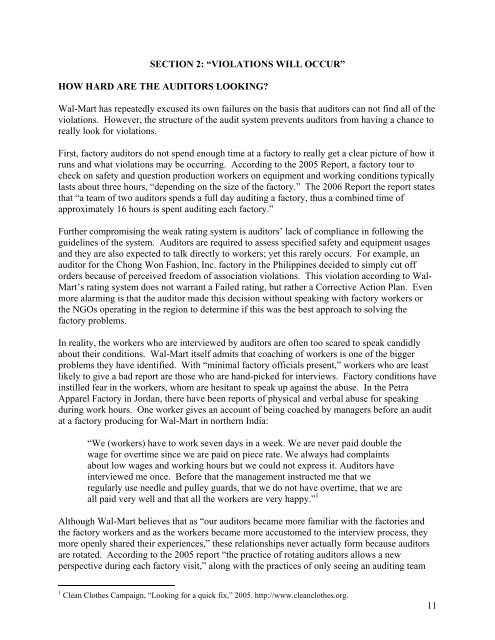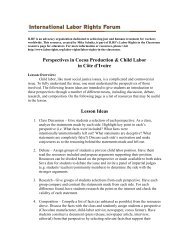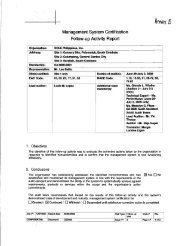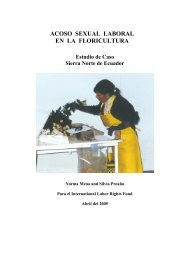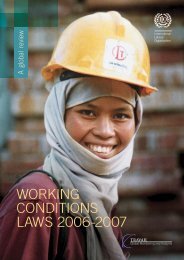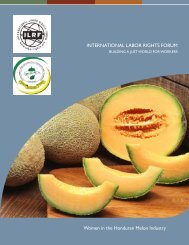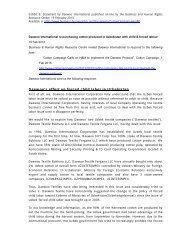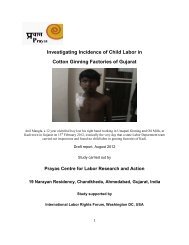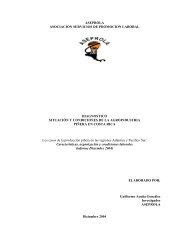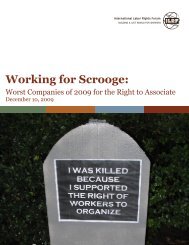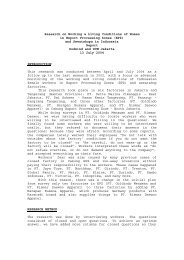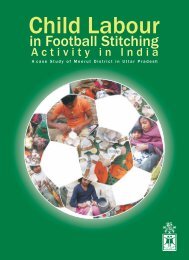Ethical Standards and Working Conditions in Wal-Mart's Supply Chain
Ethical Standards and Working Conditions in Wal-Mart's Supply Chain
Ethical Standards and Working Conditions in Wal-Mart's Supply Chain
You also want an ePaper? Increase the reach of your titles
YUMPU automatically turns print PDFs into web optimized ePapers that Google loves.
SECTION 2: “VIOLATIONS WILL OCCUR”HOW HARD ARE THE AUDITORS LOOKING?<strong>Wal</strong>-Mart has repeatedly excused its own failures on the basis that auditors can not f<strong>in</strong>d all of theviolations. However, the structure of the audit system prevents auditors from hav<strong>in</strong>g a chance toreally look for violations.First, factory auditors do not spend enough time at a factory to really get a clear picture of how itruns <strong>and</strong> what violations may be occurr<strong>in</strong>g. Accord<strong>in</strong>g to the 2005 Report, a factory tour tocheck on safety <strong>and</strong> question production workers on equipment <strong>and</strong> work<strong>in</strong>g conditions typicallylasts about three hours, “depend<strong>in</strong>g on the size of the factory.” The 2006 Report the report statesthat “a team of two auditors spends a full day audit<strong>in</strong>g a factory, thus a comb<strong>in</strong>ed time ofapproximately 16 hours is spent audit<strong>in</strong>g each factory.”Further compromis<strong>in</strong>g the weak rat<strong>in</strong>g system is auditors’ lack of compliance <strong>in</strong> follow<strong>in</strong>g theguidel<strong>in</strong>es of the system. Auditors are required to assess specified safety <strong>and</strong> equipment usages<strong>and</strong> they are also expected to talk directly to workers; yet this rarely occurs. For example, anauditor for the Chong Won Fashion, Inc. factory <strong>in</strong> the Philipp<strong>in</strong>es decided to simply cut offorders because of perceived freedom of association violations. This violation accord<strong>in</strong>g to <strong>Wal</strong>-Mart’s rat<strong>in</strong>g system does not warrant a Failed rat<strong>in</strong>g, but rather a Corrective Action Plan. Evenmore alarm<strong>in</strong>g is that the auditor made this decision without speak<strong>in</strong>g with factory workers orthe NGOs operat<strong>in</strong>g <strong>in</strong> the region to determ<strong>in</strong>e if this was the best approach to solv<strong>in</strong>g thefactory problems.In reality, the workers who are <strong>in</strong>terviewed by auditors are often too scared to speak c<strong>and</strong>idlyabout their conditions. <strong>Wal</strong>-Mart itself admits that coach<strong>in</strong>g of workers is one of the biggerproblems they have identified. With “m<strong>in</strong>imal factory officials present,” workers who are leastlikely to give a bad report are those who are h<strong>and</strong>-picked for <strong>in</strong>terviews. Factory conditions have<strong>in</strong>stilled fear <strong>in</strong> the workers, whom are hesitant to speak up aga<strong>in</strong>st the abuse. In the PetraApparel Factory <strong>in</strong> Jordan, there have been reports of physical <strong>and</strong> verbal abuse for speak<strong>in</strong>gdur<strong>in</strong>g work hours. One worker gives an account of be<strong>in</strong>g coached by managers before an auditat a factory produc<strong>in</strong>g for <strong>Wal</strong>-Mart <strong>in</strong> northern India:“We (workers) have to work seven days <strong>in</strong> a week. We are never paid double thewage for overtime s<strong>in</strong>ce we are paid on piece rate. We always had compla<strong>in</strong>tsabout low wages <strong>and</strong> work<strong>in</strong>g hours but we could not express it. Auditors have<strong>in</strong>terviewed me once. Before that the management <strong>in</strong>structed me that weregularly use needle <strong>and</strong> pulley guards, that we do not have overtime, that we areall paid very well <strong>and</strong> that all the workers are very happy.” 1Although <strong>Wal</strong>-Mart believes that as “our auditors became more familiar with the factories <strong>and</strong>the factory workers <strong>and</strong> as the workers became more accustomed to the <strong>in</strong>terview process, theymore openly shared their experiences,” these relationships never actually form because auditorsare rotated. Accord<strong>in</strong>g to the 2005 report “the practice of rotat<strong>in</strong>g auditors allows a newperspective dur<strong>in</strong>g each factory visit,” along with the practices of only see<strong>in</strong>g an audit<strong>in</strong>g team1 Clean Clothes Campaign, “Look<strong>in</strong>g for a quick fix,” 2005. http://www.cleanclothes.org.11


